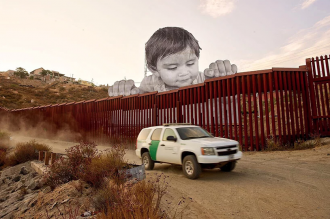Bay Area arts curator, educator and activist Christian L. Frock is joining UC Berkeley Department of Art Practice as a visiting lecturer in fall 2018 to teach Art 119 | Global Perspectives in Contemporary Art. Her course explores a range of contemporary art movements around the globe through a closer look at their central ideas, artists, and artworks, as well as the preconditions and broader social context in which the work is being produced. Topics covered will range from the emergence of localized avant-garde movements in Europe, Asia, Africa, and Latin America to the implicit globalism of the international biennial circuit.
In anticipation of her stay and course, Arts + Design spoke with Frock to get a preview of the broader context and goals of Global Perspectives in Contemporary Art.
You’ve taught this course in a number of different ways. What topics will you be covering in this year’s Global Perspectives in Contemporary Art? What do you hope Berkeley students will add or take away from the course?
We'll be considering global perspectives and the ways in which contemporary artists are engaged with various issues, from climate change to the global migrant crisis, to the sweeping impact of the #MeToo movement to the expansive impact of the internet, to the destruction of cultural memory and racial politics to rising fascism and growing state violence, and so on. I organize my classes like think tanks—we develop research collaboratively; everyone is engaged in class discussions, and students develop individual projects based on their own disciplines and interests. I tend to finalize my course reader after meeting my students and learning a bit about their interests—I want the work to be relevant to the development of their portfolios.
In particular, we're going to look at a lot of different artists working in the public realm to consider what kind of favorable impact art can have in the world. We'll foreground our research by considering privilege, responsibility, and accountability as central concerns in considering global perspectives in contemporary art.
What sources and inspirations will you draw from for the course material?
I'm perhaps a bit unusual as a curator in that I'm not limited to a particular definition of what constitutes art. I'm just as interested in contemporary painting as I am in design, or code, or music, or performance, or video—and my classes take this broad view as well. We'll cover a range of disciplines in considering global perspectives; from the likes of punk activist-group Pussy Riot disrupting the World Cup, to the artist Brother Nut disrupting the status quo with 9,000 bottles of dirty water in Beijing, to French street artist JR's work on the US–Mexico border, and on and on.
UC Berkeley’s history of activism and resistance is a defining quality of the University. Do you intend to incorporate this, or other Berkeley characteristics into your course, and if so, how?
My work, as you've noted, focuses on art and contemporary politics. Cal's long history of engagement in social movements is a thrilling context to consider these topics, particularly in relation to current global politics and the ongoing swell of public demonstrations around the world.
Christian Frock’s recent work includes the curation of “Take This Hammer: Art + Media Activism from the Bay Area” at the Yerba Buena Center for the Arts; an examination of the role that art plays in social changemaking. Her written works includes Unexpected Art, which features collections of site-specific installations and groundbreaking interventions in public spaces; and Public Scholarship, a series of educational resources that compile published positions on topical subjects in civic life, such as Dana Schutz’s painting of Emmett Till’s open casket at the 2017 Whitney Biennial. Her work has been featured in several exhibition catalogues, as well as in the publications KQED Arts, The Guardian, NPR, and the San Francisco Chronicle, among many others. Since 2009, she has also written monthly museum and gallery-critic’s picks for San Francisco Arts Monthly, a San Francisco Bay Area supplement to The New York Times.
Frock is the curator and founder of Invisible Venue, a DIY independent curatorial enterprise that produces artist projects, new commissions, site-specific installations and guerrilla interventions in public spaces. Invisible Venue collaborates with artists to present contemporary art in unexpected settings.
She has organized and curated exhibitions at world renowned institutions, including the San Francisco Museum of Modern Art, Yerba Buena Center for the Arts, and the Headlands Center for the Arts.
She has taught as visiting faculty at California College of the Arts, California Institute of Integral Studies, and San Francisco Art Institute; and has guest lectured at UC Berkeley, University of San Francisco, and Stanford University, among other schools.
